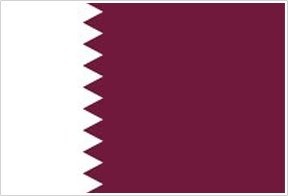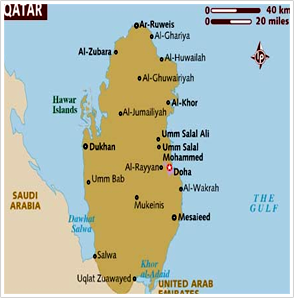Qatar


Qatar (pronounced KAH-ter) occupies a small peninsula that extends into the Persian Gulf from the east side of the Arabian Peninsula. Saudi Arabia is to the west and the United Arab Emirates to the south. The country is mainly barren.
History
Qatar was once controlled by the sheikhs of Bahrain, but in 1867, war broke out between the people and their absentee rulers. To keep the peace in the Persian Gulf, the British installed Muhammad ibn Thani al-Thani, head of a leading Qatari family, as the region's ruler. In 1893, the Ottoman Turks made incursions into Qatar, but the emir successfully deflected them. In 1916, the emir agreed to allow Qatar to become a British protectorate
Currency
The official currency is the Qatari Riyal (QR), which is divided into 100 dirhams. The Exchange parity has been set at the fixed rate of US $ = 3.65QR's.
Qatar's Economy
Qatar is one of the smallest Gulf Countries in terms of population and geographical area but the second largest gas reserves in the world representing more than 5% of the world total. The prosperity of natural resources coupled with the growing and diversifying economy means enormous access to investment opportunities and incentives. The Qatari government adopts a policy aiming at diversifying income resources and developing economic infrastructure. Specifically, the government expanded the exploration projects in oil and gas sectors and offered numerous incentives to attract foreign investors to carry out similar projects. The Qatari economy is one of the most rapidly growing economies in the world offering the international community a variety of world-class and cutting- edge products and services. With its strong and open economy, the government of Qatar is committed to international standards and practices. The country is concentrating on establishing business presence in the world community in order to leverage on globalization basis.
Offshore banking in Qatar
Opening an account for offshore savings in Qatar is a wise decision for expats for many reasons. Aside from waived or extremely cheap money exchange fees, an offshore account is taxed lightly and, in most cases, comes with a multi-currency debit card - a perfect fit for globe-trotting expats, indeed.
Banking in Qatar
Qatar's banking sector is supervised and monitored by the Qatar Central Bank (QCB) which controls the country's monetary policies. The industry is quite diversified with the existing banks being able to provide for the needs of different types of customers. Currently, there are fifteen commercial banks in Qatar composed of seven Qatari banks, two Arabian banks, and the rest are foreign banks. These banks offer all the standard services which include account opening, cheque clearance, debit and credit cards, time deposits and other investments, utilities payment, and standing orders. Charges vary among banks. Some major banks accept deposits in foreign currencies like the US dollar (USD) and the Great Britain Pound (GBP).
To open a bank account, one needs to have a residence visa, a valid passport, photos, and a "no objection certificate" or NOC from his employer. This certificate must indicate the depositor's salary. Sometimes, a tenancy agreement will be asked for in order to establish that the depositor is indeed a resident of Qatar.
ATMs are readily available for cash withdrawals. Cash payment is the usual settlement for transactions in Qatar, especially with local retailers. Credit cards are usually offered by Visa and Mastercard and are accepted in the major establishments.
Qatar Scope of Income Tax
Under Qatar's tax legislation, any business activity carried out in Qatar is subject to corporate income tax. "Activity" is defined as any occupation, profession, service, trade, or the execution of a contract, or any other business, that operates in Qatar with the aim of making a profit. This includes gains realized on the sale of a company's assets in Qatar; agency commission and fees paid for consultancy, arbitration or expertise and related services; rent from property; income from the assignment of intellectual property; and profits realized on liquidation.
Income from outside Qatar is not liable to corporate income tax; however, interest and other bank income received from outside of Qatar, but which relates to income arising from a taxpayer's business activities in Qatar, is subject to taxation.




